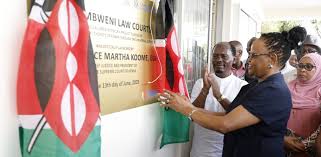Kenya has officially adopted a new Code of Conduct for Media Practice, marking a major step toward promoting responsible journalism, protecting children, and regulating the use of artificial intelligence (AI) in news production.
The updated media code replaces the previous decade-old framework under the Second Schedule of the Media Council Act, 2013. It was formally published in the Kenya Gazette (Supplement No. 70) on May 14, 2025, by the Cabinet Secretary for Information, Communications, and Digital Economy, William Kabogo.
The overhaul follows a landmark ruling by Kenya’s High Court that nullified the existing Broadcasting Code, declaring it unconstitutional. The court directed the Media Council of Kenya (MCK) to develop new, legally sound standards that better protect children, vulnerable populations, and the public at large from harmful media content.
The new Code was crafted after extensive consultations with journalists, media houses, legal experts, academics, and civil society organizations. It reflects both constitutional values and global best practices in media regulation.
The new Code introduces several important features:
AI Regulation in Journalism: Journalists and media houses must now disclose when AI tools are used to create or edit content. Misuse or publication of misleading AI-generated content will attract stiff penalties.
Protection of Children: Stronger guidelines require media houses to protect the identity and dignity of children featured in news stories. Age-appropriate content filters must now be integrated into media operations.
Responsible User-Generated Content: Media organizations are now accountable for content published through their platforms, including comments and videos submitted by the public.
Clear Separation of Gambling Content: Content related to betting, lotteries, and gaming must be clearly distinguished from regular news to protect young and vulnerable audiences.
Editorial Accountability:** Media practitioners are now subject to more robust oversight. The MCK has enhanced its ability to handle complaints and enforce standards.
MCK CEO David Omwoyo called the implementation of the Code “a defining moment for media professionalism and press freedom in Kenya.” He noted that the Code not only strengthens ethical journalism but also ensures public trust in the media remains intact.
“This is the dawn of a new era for ethical, fearless, and impactful journalism in Kenya,” Omwoyo said.
The Media Council also thanked Parliament for approving the new framework and praised the media community for their participation in shaping the policy.
“The Code demands accountability from the media and encourages constructive government critique, which fosters a media environment rooted in mutual respect,” the Council added.
Although the Code introduces significant reforms, MCK has not yet detailed how enforcement will be carried out, especially in cases involving international digital platforms or citizen journalists. More clarity is expected as implementation guidelines are rolled out in the coming months.
As Kenya modernizes its media laws to address emerging challenges like AI, misinformation, and child protection, the new Code sets a precedent for responsible journalism and digital media regulation in Africa.



